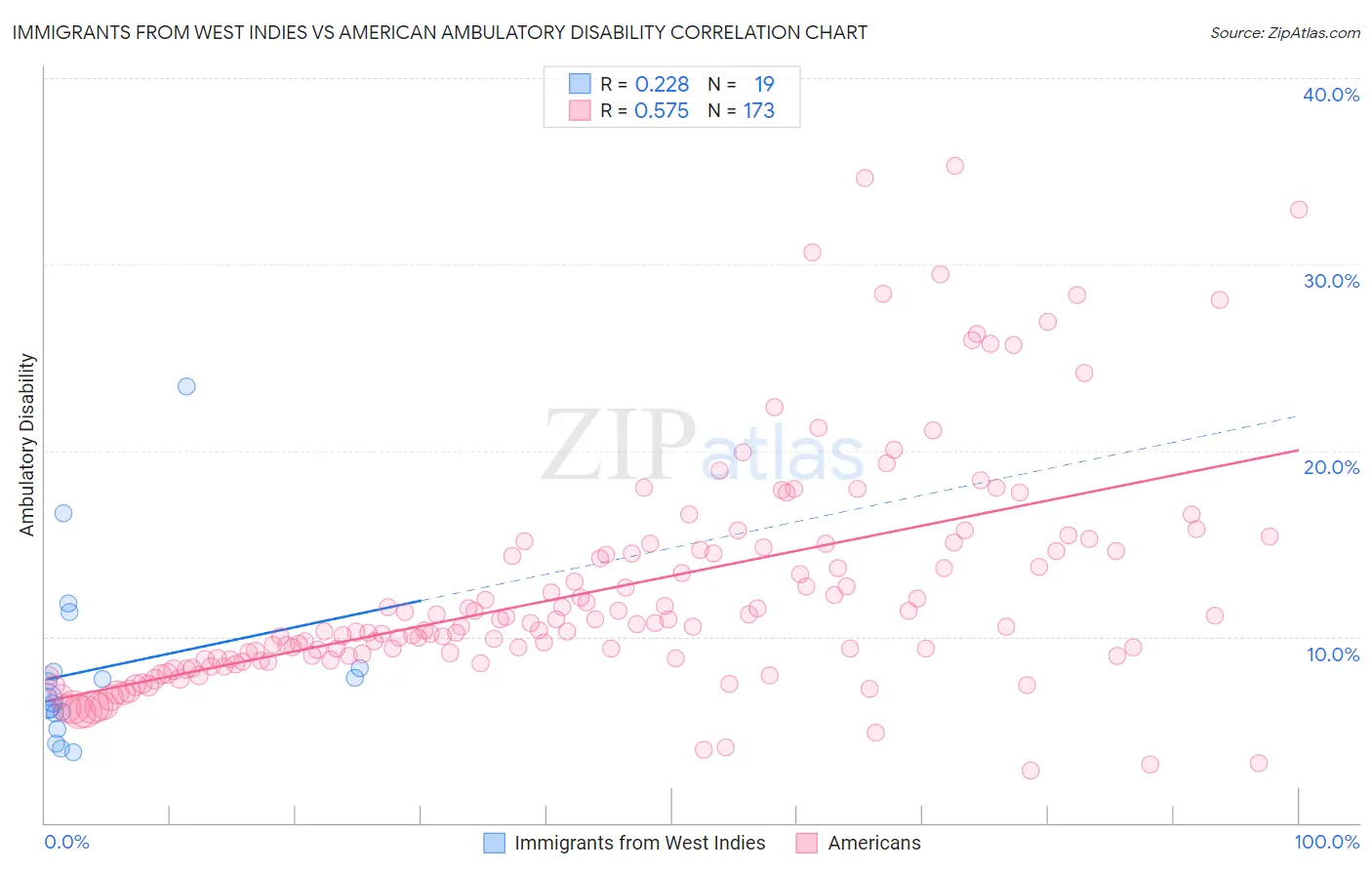Immigrants from West Indies vs American Ambulatory Disability
COMPARE
Immigrants from West Indies
American
Ambulatory Disability
Ambulatory Disability Comparison
Immigrants from West Indies
Americans
6.7%
AMBULATORY DISABILITY
0.1/ 100
METRIC RATING
278th/ 347
METRIC RANK
7.4%
AMBULATORY DISABILITY
0.0/ 100
METRIC RATING
323rd/ 347
METRIC RANK
Immigrants from West Indies vs American Ambulatory Disability Correlation Chart
The statistical analysis conducted on geographies consisting of 72,456,461 people shows a weak positive correlation between the proportion of Immigrants from West Indies and percentage of population with ambulatory disability in the United States with a correlation coefficient (R) of 0.228 and weighted average of 6.7%. Similarly, the statistical analysis conducted on geographies consisting of 581,324,022 people shows a substantial positive correlation between the proportion of Americans and percentage of population with ambulatory disability in the United States with a correlation coefficient (R) of 0.575 and weighted average of 7.4%, a difference of 10.2%.

Ambulatory Disability Correlation Summary
| Measurement | Immigrants from West Indies | American |
| Minimum | 3.8% | 2.8% |
| Maximum | 23.4% | 35.3% |
| Range | 19.6% | 32.5% |
| Mean | 8.3% | 12.5% |
| Median | 6.8% | 10.5% |
| Interquartile 25% (IQ1) | 5.9% | 8.8% |
| Interquartile 75% (IQ3) | 8.3% | 14.6% |
| Interquartile Range (IQR) | 2.4% | 5.9% |
| Standard Deviation (Sample) | 4.8% | 6.2% |
| Standard Deviation (Population) | 4.7% | 6.1% |
Similar Demographics by Ambulatory Disability
Demographics Similar to Immigrants from West Indies by Ambulatory Disability
In terms of ambulatory disability, the demographic groups most similar to Immigrants from West Indies are Jamaican (6.7%, a difference of 0.080%), Celtic (6.7%, a difference of 0.15%), Immigrants from Guyana (6.7%, a difference of 0.18%), Sioux (6.7%, a difference of 0.25%), and Immigrants from Caribbean (6.7%, a difference of 0.31%).
| Demographics | Rating | Rank | Ambulatory Disability |
| Immigrants | Trinidad and Tobago | 0.1 /100 | #271 | Tragic 6.7% |
| French Canadians | 0.1 /100 | #272 | Tragic 6.7% |
| Whites/Caucasians | 0.1 /100 | #273 | Tragic 6.7% |
| Sioux | 0.1 /100 | #274 | Tragic 6.7% |
| Immigrants | Guyana | 0.1 /100 | #275 | Tragic 6.7% |
| Celtics | 0.1 /100 | #276 | Tragic 6.7% |
| Jamaicans | 0.1 /100 | #277 | Tragic 6.7% |
| Immigrants | West Indies | 0.1 /100 | #278 | Tragic 6.7% |
| Immigrants | Caribbean | 0.0 /100 | #279 | Tragic 6.7% |
| Pennsylvania Germans | 0.0 /100 | #280 | Tragic 6.8% |
| Yaqui | 0.0 /100 | #281 | Tragic 6.8% |
| Barbadians | 0.0 /100 | #282 | Tragic 6.8% |
| Immigrants | Barbados | 0.0 /100 | #283 | Tragic 6.8% |
| Immigrants | Jamaica | 0.0 /100 | #284 | Tragic 6.8% |
| Fijians | 0.0 /100 | #285 | Tragic 6.8% |
Demographics Similar to Americans by Ambulatory Disability
In terms of ambulatory disability, the demographic groups most similar to Americans are Osage (7.4%, a difference of 0.28%), Apache (7.4%, a difference of 0.42%), Potawatomi (7.3%, a difference of 1.2%), Navajo (7.5%, a difference of 1.3%), and Comanche (7.5%, a difference of 1.4%).
| Demographics | Rating | Rank | Ambulatory Disability |
| Immigrants | Dominican Republic | 0.0 /100 | #316 | Tragic 7.1% |
| Central American Indians | 0.0 /100 | #317 | Tragic 7.2% |
| Ottawa | 0.0 /100 | #318 | Tragic 7.2% |
| Dominicans | 0.0 /100 | #319 | Tragic 7.2% |
| Potawatomi | 0.0 /100 | #320 | Tragic 7.3% |
| Apache | 0.0 /100 | #321 | Tragic 7.4% |
| Osage | 0.0 /100 | #322 | Tragic 7.4% |
| Americans | 0.0 /100 | #323 | Tragic 7.4% |
| Navajo | 0.0 /100 | #324 | Tragic 7.5% |
| Comanche | 0.0 /100 | #325 | Tragic 7.5% |
| Blacks/African Americans | 0.0 /100 | #326 | Tragic 7.5% |
| Natives/Alaskans | 0.0 /100 | #327 | Tragic 7.5% |
| Hopi | 0.0 /100 | #328 | Tragic 7.6% |
| Pueblo | 0.0 /100 | #329 | Tragic 7.6% |
| Paiute | 0.0 /100 | #330 | Tragic 7.7% |